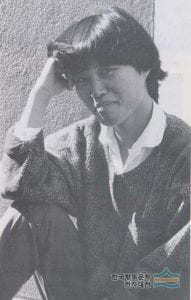Assistant Professor, Asian Languages and Cultures, Northwestern University
“Korean Writing in the Age of Multilingual Word Processing:
A History of the Non-Linear Alphabet and the Cultural Technique of Writing”
Time: Friday, February 17, 3:00-5:00 pm CT
Location: Center for East Asian Studies 319 (1155 E. 60th St.)
★Co-Sponsored by Digital Media Workshop★

Abstract: In 2016, South Korean Prime Minister Hwang Kyoan reflected that hangul “has been the foundation of the country as an IT powerhouse.” Claiming that the almost 500-year-old script of hangul was “well suited for the age of information,” the Prime Minister emphasized that the “glorious national culture” has prospered based on this “ingenious and scientific” national script. He was right that the information boom of the 1980s and 1990s played a crucial role in the final abolishment of the Chinese script and the ascendance of hangul in South Korea. But contrary to the Prime Minister’s claim, the non-Western alphabet of hangul posed various technological difficulties whenever new information technology appeared, and the technology of the digital computer was no exception. But the crisis that the Korean writing system encountered cannot be properly grasped based on Thomas Mullaney’s criticism of the “false universalism” where “all alphabets and syllabaries against the one major world script that is neither: character-based Chinese writing.” Nor can it be fully grasped with Yurou Zhong’s criticism of Western phonocentrism. Although, she is correct to cite Walter Ong’s observation that there have been “many scripts but only one alphabet” as she challenges the hidden assumption of the alphabetic universalism where the Roman-Latin alphabet occupies the top floor of the “grammatological hierarchy.” Focusing on the history of the 1980s, I argue that the central problem that the Korean and East Asian writing system at large faced was rather closely related to “the principle of linearity.” This was one of the two major theoretical principles undergirding the Geneva school of linguistics and what various “Western” information technologies have been long founded upon even before Saussure’s theorization. A marginal/borderline object in my analysis will be how phonemes in the Korean alphabet do not only combine with one another linearly, but both vertically and horizontally much like the Chinese script.
Presenter: Dahye Kim is an assistant professor of Asian languages and cultures at Northwestern University. Her research interests include modern Korean literature and media culture, critical approaches to media history, and the cultural dimensions of communication technologies in Korea. She is especially interested in changing the significance and signification of literature and literacy in the evolving media studies landscape.
Respondent: Thomas Lamarre is a scholar of media, cinema and animation, intellectual history, and material culture, with projects ranging from the communication networks of 9th century Japan (Uncovering Heian Japan: An Archaeology of Sensation and Inscription, 2000), to silent cinema and the global imaginary (Shadows on the Screen: Tanizaki Jun’ichirō on Cinema and Oriental Aesthetics, 2005), animation technologies (The Anime Machine: A Media Theory of Animation, 2009) and on television infrastructures and media ecology (The Anime Ecology: A Genealogy of Television, Animation, and Game Media, 2018).



